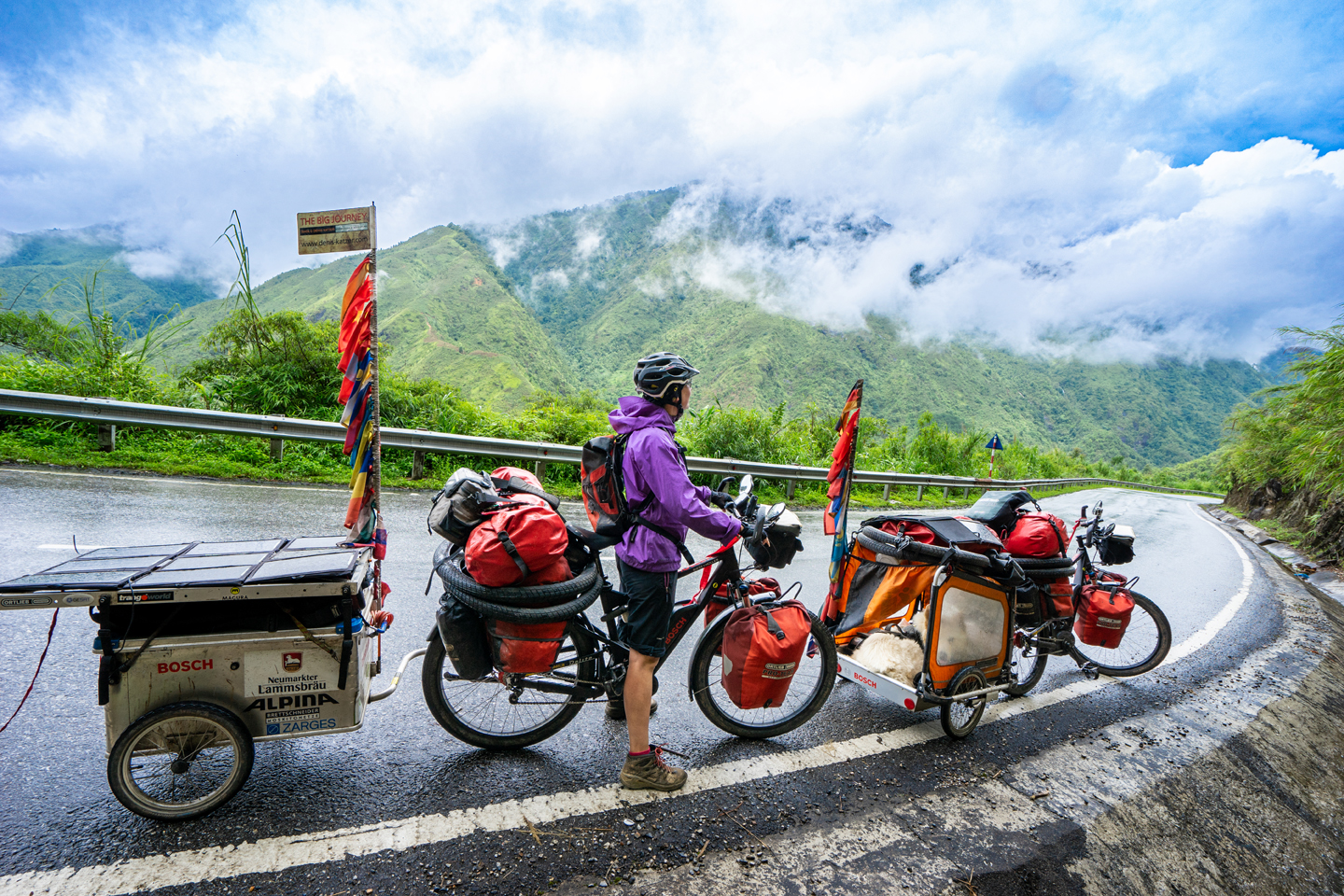
Sweet voices call
N 55°54'35.7'' E 095°06'25.5''
Day: 17
Sunrise:
04:58 pm
Sunset:
10:28 pm
As the crow flies:
50.11 Km
Daily kilometers:
75.92 Km
Total kilometers:
11045.82 Km
Soil condition:
Asphalt / bad
Temperature – Day (maximum):
17 °C
Temperature – day (minimum):
13 °C
Temperature – Night:
9 °C
Latitude:
55°54’35.7”
Longitude:
095°06’25.5”
Maximum height:
438 m above sea level
Maximum depth:
290 m above sea level
Time of departure:
11:25 a.m.
Arrival time:
7:40 pm
Average speed:
13.72 Km/h
We leave the comfortable beds at 8:30 am. Outside, it’s pouring with rain again. “We should have left yesterday”, I lament, because it was the first sunny day since our stay in Siberia. Nevertheless, we can’t stay here any longer. After all, we also want to make progress. After breakfast, we carry all our equipment to the Paterre. “Dobre utra” (Good morning) is the friendly greeting we receive from two women who are in the process of giving the room opposite a new coat of paint that smells of chemicals. “Dobre utra”, we reply cheerfully. There has been a shift change down in the realm of the dragon. “Dobre utra” (Good morning) is another very friendly greeting from two ladies. “Charoscho spat?” (Did you sleep well?) they ask. “Otschin charascho”, (very good) we reply, delighted by the pleasant friendliness. As we load our bikes, the women of the Gastiniza watch us with interest. “Da ßwidanja!” (See you again), we call out to them as we get on our bikes a little later and leave the accommodation behind us. We stop our trains at one of the few traffic lights. A boy about eight years old rattles past on his little bike. He has attached playing cards to his spokes with laundry gussets so that his engine makes real noises. He proudly turns to look at us. “Did they really see me,” he seems to ask himself. Then the completely rusted traffic lights clear the way for us. “Da ßwidanja Tanja!”, (See you again Tanja) calls a woman behind her fruit stall, waving in a friendly manner. “That was the woman who helped me check into the Gastiniza,” I say. “Yes, that was her,” Tanja confirms, waving at the woman. Then the first ascent takes our full attention. After eight kilometers we reach the main road again. It’s raining as usual and the thermometer is 13 degrees on the second of July.
Seven and a half hours later, at around 19:00, the dark misty arms of the storm clouds are still reaching for us. To the left and right, the road is bordered by a dark, almost eerie-looking forest. I dread the thought of having to set up camp there for the night. I can literally hear the army of ticks calling out to us in sweet voices like Greek sea nymphs. “Kooommt! Come and join us! Let us suck your delicious blood.” The only difference is that the Siberian ticks do not have bird bodies like the Greek sirens, but small tick bodies and tiny feeding pincers instead of female heads. “Huaa, look at that wet, dripping, dark forest. I don’t want to go in there right now,” I say and don’t even have to tie myself to the frame of my bike. The Greek hero Odysseus did not have a bicycle frame to which he tied himself so as not to be attracted by the alluring song of the sirens, but a ship’s mast. But that doesn’t matter at this moment. My ship is my Intercontinental and our sea is the Siberian taiga. “According to tradition, the Sirens drowned themselves in the sea out of anger because they couldn’t get Odysseus?” asks Tanja. “I think so,” I reply, amused. “It would be good if the ticks committed collective suicide because they can’t bite us now,” she replies, to which we laugh heartily.
At 7:40 pm, after 75 kilometers and 464 meters of altitude difference over the hilly landscape and through mostly very bad weather, I discover a nice camp site. A flowering meadow lies before us, surrounded by the endless taiga. “Will we get down there?” I ask, as there is a steep slope between the meadow and the road. Because Tanja has the lighter bike, she tries it first. It looks downright breathtaking as she pushes her barge down the three-meter drop. “That won’t work with your bike. Wait, I’ll come and hold your trailer,” she says, puts her bike on the grass and helps me get my bike off the road. Once we have everything intact in the Siberian summer meadow, we push our roadtrains through the dense and tall grass. We find an idyllic spot for the night behind a clump of trees. Mushrooms grow here in large numbers. As soon as we have pitched our tent, the storm clouds disappear almost completely. Warming and bright rays make the evening unforgettably beautiful. Only the mosquitoes are and remain a nuisance. To protect ourselves, we pull a mosquito net over our heads and spray ourselves with insect repellent.
As we spread Rapunzel sesame butter, which Tanja defended so vehemently at Frankfurt airport, on fresh bread and drink hot tea with it, a shepherd rides past on a large dark horse. His dog inspects our camp but is ordered back with a short whistle. “I wonder where he wants to go?” asks Tanja. “He will have his herd of cattle there at the edge of the forest,” I assume because I hear a quiet mooing from time to time.

